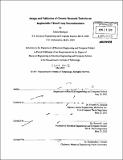Design and validation of chronic research tools for an implantable closed-loop neurostimulator
Author(s)
Shafquat, Afsah
DownloadFull printable version (12.08Mb)
Other Contributors
Massachusetts Institute of Technology. Dept. of Electrical Engineering and Computer Science.
Advisor
Timothy A. Dension and Steven B. Leeb.
Terms of use
Metadata
Show full item recordAbstract
Neurostimulators today provide high frequency Deep Brain Stimulation (DBS) for therapeutic modulation of diseased neural circuits. These devices are approved for the treatment of Parkinson's Disease, Essential Tremor and Dystonia, and are in clinical evaluations for Epilepsy and Depression. Despite the success of DBS therapy, the current systems are open-loop, where the clinician is the sensor and control algorithm, and hence these are programmed with stimulation parameter settings based on acute clinical observations. The need to move towards an effective closed-loop system drives the research for understanding the dynamics of the neural circuits. This work assessed the feasibility of use of a unique implantable research tool, which has sensing and algorithm technology added to an existing DBS device, for a chronic, in-vivo study of the brain state dynamics in an ovine model and presented preliminary validation of the neural interface. In addition, the sensing technology of this bi-directional neural interface was also validated using data from Brain Machine Interface studies. Finally, the work also involved development of a software tool which is a platform for analyzing neural activity datasets from different studies using machine learning techniques.
Description
Thesis (M. Eng.)--Massachusetts Institute of Technology, Dept. of Electrical Engineering and Computer Science, 2011. Cataloged from PDF version of thesis. Includes bibliographical references (p. 119-120).
Date issued
2011Department
Massachusetts Institute of Technology. Department of Electrical Engineering and Computer SciencePublisher
Massachusetts Institute of Technology
Keywords
Electrical Engineering and Computer Science.